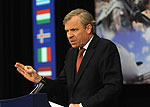From the event
- Meeting of the North Atlantic Council in Foreign Ministerial Session, NATO HQ, Brussels, 6th March 2008
- Audio file (MP3/1.782Kb)

Brussels
6 Mar. 2008
Opening statement
by NATO Secretary General, Jaap de Hoop Scheffer

Mesdames et Messieurs les ministres, Excellences, Mesdames, Messieurs,
Bonjour, permettez-moi de vous souhaiter la bienvenue à Bruxelles, au siège de l'OTAN, à l’occasion de cette réunion informelle des ministres des Affaires étrangères des pays de l’OTAN.
Dans quatre semaines, début avril, nos chefs d’État et de gouvernement se réuniront à Bucarest pour le plus grand sommet jamais organisé par l’OTAN auquel prendront part plus de 60 pays, ainsi que les principales organisations et institutions internationales. Notre réunion d’aujourd’hui sera, pour les ministres des Affaires étrangères des pays de l'OTAN, la dernière occasion, avant le sommet, de préparer le terrain en vue des décisions qui devront y être prises.
À ce propos, l’élargissement constituera un point important de notre ordre du jour d’aujourd’hui.
Albania, Croatia and the former Yugoslav Republic of Macedonia1 have been working hard, within the framework of NATO’s Membership Action Plan, to meet the standards NATO sets for its members. Until now, we have always said, rightly, that it was too early to discuss the membership prospects of the 3 MAP countries. But now, with Bucharest just around the corner, the time has come. Today will be an important discussion between Allies on how they see the enlargement process moving forward.
We will also look at broader issues of Euro-Atlantic integration, including how to deepen our engagement with our Partners in the Western Balkans. Because all Allies believe that, in the long run, the only recipe for lasting peace and stability in the Balkans is Euro-Atlantic integration.
We will also discuss today our relations with Ukraine and Georgia.
We already have, with both countries, an Intensified Dialogue
which has helped to deepen our practical and political relations.
Both countries have recently made known their aspirations to move
formally onto NATO’s track.
We will share views this morning on the future of our relations
with them.
We will then turn to our operations – beginning with Kosovo.
NATO, as an organisation, has not the authority to recognise a
country. We are not in the recognition business. Our job is
security. I think we should all be encouraged by what we have not seen
inside Kosovo, since the declaration of independence: no inter-ethnic
violence; no mass flows of refugees; no organised attacks on patrimonial
sites. This is positive, and KFOR will continue to play its role,
protecting majority and minority alike throughout Kosovo, according
to its UN mandate.
But the situation is volatile, and we will discuss today the full
range of issues relating to Kosovo.
Our major military operation is, of course, Afghanistan. Our operation there, in support of the Afghan people, is achieving success. Our discussions today will help prepare the ground for the major meeting we will have in Bucharest, where Heads of State and Government will approve a political-military plan which will guide our operation in Afghanistan for the coming years, as part of a stepped-up comprehensive international effort.
It is fair to say we have a full agenda before us this morning. Let me simply conclude this Opening Session by asking the press to leave the room, so that we can begin our deliberations.
Thank you.
- Turkey recognizes the Republic of Macedonia with its constitutional name.